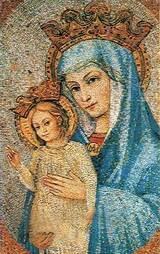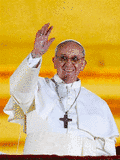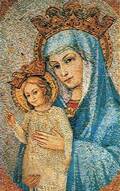SOUTH KOREA - 대한민국
Saint John Paul II was twice a pilgrim to South Korea: in 1984, the bicentenary of the Catholic Church in Korea when he canonized the 103 Korean Martyr Saints Andrew Kim Taegon, Paul Chong Hasang & Companions, and in 1989. Pope Francis came here on pilgrimage in 2014.
Here below are responses for Totus2us podcasts given by Koreans
- many thanks to you all ♥
To download the free mp3 Totus2us audio recordings, right/double click on the play buttons - 재생 버튼을 무료 mp3 Totus2us 오디오 녹음, 좌 / 더블 클릭을 다운로드하려면
Act of Entrustment of Korea to Mary
declared by Saint John Paul II
Cathedral of the Immaculate Conception Seoul, Sunday 6 May 1984 - also in Italian
Mother of all men and all peoples,
you know the sufferings and hopes of each person.
As Mother,
you know the struggle between light and darkness,
between good and evil,
which is taking place in the world and within our hearts.
You bore Jesus,
the Son of Man and the Son of God,
in whom the people of Korea,
in luminous joy,
but also through much suffering,
have found "the way, the truth, and the life".
O Mother of mercy,
we now entrust to your loving heart
the entire people and the Church of this land.
Keep us from all injustice,
division, violence, and war.
Protect us from temptation
and from the bondage of sin and evil.
Be with us!
Help us to overcome doubt with faith,
selfishness with service,
pride with meekness,
hatred with love.
Help us to live the Gospel with the "foolishness" of the Cross,
bearing witness to Jesus
who died on it,
so that we may rise
with your Son unto true life
with the Father in the unity of the Holy Spirit.
O Mother of Christ, comfort and give strength to all those who suffer: the poor, the lonely, the sick, the unloved, the downtrodden, the forgotten.
Bless us!
Pray for us!
Together with Saint Joseph,
unite us all in love.
Give peace to our divided land,
and the light of hope to all.
Show us the blessed fruit of thy womb: Jesus! Amen."
"Con la mia esperienza anche in mia vita ho visto Maria come la vera mia Mamma."
Antonio gives his something about Mary in Korean & Italian.
"Mary to me is a wonderful mother. She's very caring, extremely supportive and kind. She always calls I think all people back to her as a mother and through her I've experienced a lot of graces and a lot of healing, always protected, and I love her very much."
"I’m really happy now and my Mary is always in my mind, my heart, my whole life. I love Mary."
Sister Lucia is a sister of the Handmaids of the Sacred Heart of Jesus.
"The Mother of God is our mother."
"Sono molto contenta per l'elezione del nuovo Papa Francesco. Lui è un uomo umile e anche giusto che mi piace molto."
Sister Teresita gives her response for 비바 파파 프란체스코 in Italian & Korean.
If you'd be up for giving Our Lady a metaphorical bunch of flowers by saying your something about Mary, please do get in touch with the Totus2us team.
- as well as hopefully bringing you joy,
you'd be really helping Totus2us ♥
Totus tuus ego sum et omnia mea tua sunt.
Accipio te in mea omnia. Praebe mihi cor tuum, Maria.
"I am totally yours and all that I have is yours.
I accept you for my all. O Mary, give me your heart.” - St Louis Marie de Montfort
St John Paul II took his motto Totus Tuus from this quote.
Pope Francis' reflection on his pilgrimage to Korea
General Audience, Wednesday 27 August 2014 - also in Arabic, French, German, Italian, Polish, Portuguese & Spanish
"Dear Brothers and Sisters, Good morning,
In recent days I made an apostolic journey to Korea and today, together with you, I thank the Lord for this great gift. My journey enabled me to visit a young and dynamic Church, founded on the testimony of martyrs and filled with missionary zeal, in a country which is a point of encounter between ancient Asian cultures and the perennial newness of the Gospel: both are encountered.
Once again I wish to express my gratitude to my dear brother Bishops of Korea, to the President of the Republic, to the other Authorities and to all those who collaborated in my visit.
The significance of this apostolic journey can be summed up in three words: memory, hope and witness.
The Republic of Korea is a country whose economic development is remarkably rapid. Its inhabitants are hardworking, disciplined and organized, and must maintain the strength inherited from their ancestors.
In this setting, the Church is the guardian of memory and hope: she is a spiritual family in which the adults pass on to the young the torch of faith received from their forebears. The memory of past witnesses becomes a new witness in the present and hope for the future. One can read, from this perspective, the two principal events of this journey: the beatification of the 124 Korean Martyrs, who join those canonized by St John Paul II 30 years ago; and the encounter with young people on the occasion of the Sixth Asian Youth Day.
A young person is always a person in search of something worth living for, and a Martyr bears witness to something, rather to Someone worth giving one’s life for. This reality is the Love of God, which was made flesh in Jesus, the Witness of the Father. In two moments of the journey dedicated to young people, the Spirit of the Risen Lord filled us with joy and hope, which the young people will take back to their countries, and that will do so much good!
In Korea the Church also safeguards the memory of the primary role played by lay people, both at the dawn of the faith and in the work of evangelization. In that land, in fact, the Christian community was not founded by missionaries but by a group of young Koreans in the latter half of the 1700s. They were captivated by several Christian texts which they studied in depth and chose as their rule of life. One of them was sent to Peking to receive Baptism and then this layman baptized his companions. From that first core a great community developed, which from the very start and for about a century was subjected to violent persecution, with thousands of martyrs. Thus, the Church in Korea was founded on faith, on missionary commitment and on the martyrdom of the lay faithful.
The first Korean Christians chose the apostolic community of Jerusalem as a model, practicing fraternal love which overcomes every social difference. This is why I have encouraged modern Christians to be generous in sharing with the poorest and the excluded, in line with Chapter 25 of the Gospel according to Matthew: “as you did it to one of the least of these my brethren, you did it to me” (v. 40).
Dear brothers and sisters, it is seen in the history of the faith in Korea that Christ does not nullify cultures, he does not suppress the journey of the peoples who, over centuries and millennia, have sought the truth and practiced love of God and neighbour. Christ does not abolish what is good, but he enhances it, he brings it to fulfillment.
What Christ fights and conquers, on the other hand, is the Evil One, who causes difficulties between individuals, between peoples; who creates exclusion and incites the idolatry of money; who places the poison of nothingness in the hearts of young people. Yes, Jesus has fought and conquered this with his Sacrifice of love. And if we remain in Him, in his love, we too, like the Martyrs, can live and witness to his victory. With this faith, we prayed and we still pray now so that all the sons and daughters of the land of Korea, who suffer the consequences of war and division, may fulfil a journey of fraternity and of reconciliation.
This journey was illuminated by the feast of the Assumption of Mary into Heaven. From on high, where she reigns with Christ, may the Mother of the Church journey with the People of God, support their steps in the most arduous conditions, comfort those in their trials and keep the horizon of hope open. Through her motherly intercession, may the Lord always bless the Korean people, grant them peace and prosperity; and bless the Church which lives in that land, that it may be ever fruitful and filled with the joy of the Gospel."
Greetings:
"Je vous salue bien cordialement chers amis de langue française. A l’occasion de votre pèlerinage à Rome, je vous invite à vous unir à la prière de toute l’Eglise pour ces communautés d’Asie que je viens de visiter, ainsi que pour tous les chrétiens persécutés dans le monde, particulièrement en Iraq. Que Dieu vous bénisse !
I offer an affectionate greeting to the young altar servers from Malta, and I thank them for their faithful service in Saint Peter’s Basilica this past month. Upon all the English-speaking pilgrims taking part in today’s Audience, including those from the United Kingdom and Japan, I invoke the joy and peace of the Lord Jesus. God bless you!
Gerne begrüße ich die Pilger deutscher Sprache, die zur heutigen Audienz gekommen sind. Übermittelt meine Grüße auch den vielen Koreanern, die in Deutschland, Österreich und in der Schweiz leben. Wir können voneinander lernen und uns im Glauben stärken. Vertrauensvoll bitten wir Gott, dass die Menschen in Korea, die an den Folgen von Krieg und Teilung leiden, einen Weg zur vollen Versöhnung gehen können. Euch allen wünsche ich einen gesegneten Aufenthalt in Rom.
Saludo cordialmente a los peregrinos de lengua española, en particular a los grupos provenientes de España, Argentina y otros países latinoamericanos. De modo especial, saludo a los campeones de América, al equipo de San Lorenzo, aquí presente, que es parte de mi identidad cultural. Que la peregrinación al Sepulcro de los Apóstoles Pedro y Pablo aumente su fe y estimule su caridad para con los pobres y necesitados.
Saúdo cordialmente os peregrinos de língua portuguesa, em particular o grupo de Vilar de Andorinho. A minha viagem à Coreia foi iluminada pela festa de Maria Assunta ao Céu: lá do Alto, onde reina com Cristo, a Mãe da Igreja conforta todos aqueles que estão na provação e mantém aberto o horizonte da esperança. Enquanto vos entrego, a vós e às vossas famílias à sua protecção, invoco sobre todos a Bênção de Deus.
Witam polskich pielgrzymów. Drodzy bracia i siostry, dziękując Panu za dar spotkania z narodem koreańskim i z młodymi Azji, wybiegam myślą ku spotkaniu z młodzieżą świata, które – jak Bóg pozwoli – odbędzie się w Krakowie. Modlę się, by przygotowania do przyszłego Dnia Młodzieży były dla wszystkich okazją do pogłębienia wiary, nadziei i miłości. Młodym, którzy w okresie wakacji w różnych wspólnotach przeżywają rekolekcje i pielgrzymki, dziękuję za życzenia, wyrazy duchowej bliskości i modlitwy w mojej intencji. Wszystkich zawierzam opiece Matki Najświętszej i z serca błogosławię.
* * *
I also thank you for the prayers and condolences for what happened to my family. The Pope has a family too. There were five of us siblings; I have 16 nieces and nephews. One of my nephews had a car accident: his wife and two young children — one was two years old and the other several months — died and he is currently in critical condition. I thank you so very, very much for your condolences and prayers.
I address a special thought to the young people, especially those from the Dioceses of San Miniato and Livorno, to the sick and to newlyweds. Today we celebrate the feast day of St Bernard, Abbot and Doctor of the Church. May his love for Our Lady, Star of the Sea inspire the Christian life of each one: may we learn to look to and to invoke Mary that we may never be defeated by sin and may be able to experience the fruits of the grace given us by Jesus, her Son."
Pope Benedict XVI's Letter to the President of the Republic of Korea
- also in French, German, Portuguese & Spanish
To His Excellency Mr. Roh Moo-hyun President of the Republic of Korea
I am pleased to welcome Your Excellency to the Vatican and I thank you for your visit, which serves to strengthen the good relations that exist between your country and the Holy See. Your presence here is also a clear sign of your esteem for the Catholic Church. I would ask you to convey my affectionate greetings to the people of Korea, and to assure them of my prayers for peace and stability on the Korean peninsula and throughout the region.
For over fifty years, the Korean people have suffered the consequences of division. Families have been split, close relatives have been separated from one another. Please let them know that I am spiritually close to them in their suffering. On compassionate grounds, I pray for a speedy solution to the problem which impedes so many from communicating with one another.
Sadly, the modem world is marked by an increasing number of threats to the dignity of human life. I wish therefore to commend all those in your country who work to uphold and defend the sanctity of life, marriage and the family, areas in which, as you know, the Catholic Church in Korea is particularly active. The risk of a nuclear arms race in the region is a further source of concern, fully shared by the Holy See. I urge ail interested parties to make every effort to resolve the present tensions through peaceful means and to refrain from any gesture or initiative that might endanger the negotiations, while ensuring that the must vulnerable part of the North Korean population has access to humanitarian aid.
Mr. President, your country has experienced remarkable economic growth in recent times, for which I give thanks to God. At the same time, I am conscious that not all citizens are yet able to benefit fully from this increased prosperity. I therefore urge your Government to work in harmony with all those who seek to promote the common good and social justice.
In the meantime, I call upon Saint Andrew Kim Taegon and the Korean martyrs to protect the citizen of your beloved nation, and I assure you of my prayers and good wishes for all the people of Korea.
From the Vatican, 15 February 2007
BENEDICTUS PP. XVI
Benedict XVI's Message to the President of the Republic of Korea,
H.E. Mr Lee Myung-Bak, on the occasion of the G20 Summit in Seoul - in English, French, German, Italian, Portuguese & Spanish
Mr. President,
The meeting about to take place in Seoul of Heads of States and Government of the world's twenty-two leading economies together with the Secretary-General of the United Nations Organization, the Presidency of the European Union and some regional Organizations, as well as the leaders of various specialized Agencies, is not only of global importance but also clearly expresses the significance and responsibility which Asia has acquired on the international scene at the beginning of the 21st century. The Korean Presidency of the Summit is a recognition of the significant level of economic development attained by your country, which is the first among those not belonging to the G8 to host the G20 and guide its decision in the world to alter the crisis. The Summit seeks solutions to quite complex questions, on which the future of upcoming generations depends and which therefore require the cooperation of the entire international community, based on the acknowledgement – which is shared and agreed by all peoples – of the primary and central value of human dignity, the final objective of the choices themselves.
The Catholic Church, in accordance with her specific nature, regards herself as involved and shares the concerns of the leaders who will take part in the Seoul Summit. I therefore encourage you to tackle the numerous serious problems facing you – and which, in a sense, face every human person today – bearing in mind the deeper reasons for the economic and financial crisis and giving due consideration to the consequences of the measures adopted to overcome the crisis itself, and to seek lasting, sustainable and just solutions. In doing so, it is my hope that there will be a keen awareness that the solutions adopted, as such, will work only if, in the final analysis, they are aimed at reaching the same goal: the authentic and integral development of man.
The world's attention focuses on you and it expects that appropriate solutions will be adopted to overcome the crisis, with common agreements which will not favor some countries at the expense of others. History, furthermore, reminds us that, no matter how difficult it is to reconcile the different socio-cultural, economic and political identities coexisting today, these solutions, to be effective, must be applied through combined action which, above all, respects the nature of man. It is decisive for the very future of humanity to show the world and history that today, thanks also to this crisis, man has matured to the point of being able to recognize that civilizations and cultures, like economic, social and political systems, can and must converge in a shared vision of human dignity, which respects the laws and requirements placed in it by God the Creator. The G20 will respond to the expectations placed in it and grant real success to future generations, if taking into consideration the various and sometimes contrasting problems afflicting the peoples of the earth, it is able to set out the characteristics of the universal common good and demonstrate its willingness to cooperate in order to attain it.
With these sentiments I invoke God's blessings on all taking part in the Seoul Summit and I avail myself of the occasion to renew to Your Excellency the assurance of my highest consideration.
From the Vatican, 8 November 2010
BENEDICTUS PP. XVI
Pope St John Paul II's Message for Children's Day in South Korea
Municipal Stadium Mudung in Kwangju, Korea, on Friday 4th May 1984 - also in Italian
"Dear Children of Korea,
It is a joy for me to greet you today and to offer you a special message for Children’s Day.
What I want to speak to you about is love, the love for which you were made, the love that each one of you longs for.
1. One of the disciples of Jesus, called John the Evangelist, wrote a letter to the early Christians explaining that "love is of God" and that "God is love" (1 Jn 4, 7-8). The God who is love, and who has loved us so much, has in fact given us a share in his life, just as a father shares his life with his children. And God wants us to love him in return for the love and the life that he has given us. God is our Father and he asks us to love him as his children.
But God also wants us to love others. This is the meaning of our lives: to love God and to love others - to love our parents, our brothers and sisters, our relatives and friends, all our fellow human beings, even those who may have hurt us or offended us. To love our neighbour means living for others, lending a helping hand, giving service where needed, being just, honest and pure, gentle, truthful and kind. To love our neighbour means helping to build a better world.
We do this not so much by words as by what we do, because action speak louder than words. That is what Saint John meant when he wrote: "Little children, let us not love in word or speech but in deed and in truth" (1 Jn 3, 18).
2. Dear children of Korea: all the world’s children, all the people in the world deserve your love, regardless of their nationality, sex, religion or race; whether they are strong or weak, rich or poor, healthy or sick. To love is to think about other people, to accept others, to go out of your way to help them, to serve them, to encourage them. To share with others the world and its good things, the way that God has shared them with you. In loving others, you will discover the meaning of life; indeed you will discover the Giver of life. the Creator of the world, the God and Father of us all.
3. And if you are Christian, dear children, you have a special reason to love: in order to be like Jesus, who is God’s eternal Son, the Son who became man in order to give his life for us on the Cross, out of love, to help us to understand the meaning of love, to make us too able to love.
4. And today, I, John Paul II, as the representative of Jesus, as Bishop of Rome, offer my love to every boy and girl in Korea, to each and every one without any distinction. I proclaim your human dignity as children of God created to share in God’s love forever. I proclaim your rights, no matter how little or helpless you may be and I proclaim the duties that go with your rights, which you are called to perform out of love, in order to safeguard the rights of others. I especially love every child who suffers, who is lonely, who is abandoned, especially those with no one to love them and care for them. Dear children, I give you all the love of my heart.
I also want to encourage all those working to build a world of peace for you to live in, those who take care of your health, who teach you, who speak to you about God. I am spiritually close to your parents, who have transmitted to you God’s gift of life and are the first ones to teach you the meaning of love. Today I join my love to theirs, and together we join our love to the love of God, who has loved us and asks us to love in return.
Dear children of Korea, your future and the destiny of this land depend, under God, on your willingness to love. This is my message for today and for the years to come, my message of love: "Beloved, let us love one another: for love is of God" (1 Jn 4, 7).





